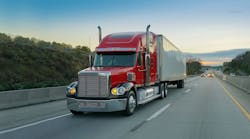Lately much of the work we’ve been doing has been focused on regional haul, especially with all the effort involved in getting Run on Less Regional up and running.
We have all learned a lot about the regional haul segment of the trucking industry preparing for the Run. Factors are coming together — including the growth of e-commerce and the desire for drivers to be home more often — that are causing this segment of the market to grow.
We’ve always had regional haul operations, think private fleets and less-than-truckload carriers, but they just have not seemed to be as visible as long-haul trucking. That perhaps is because pop culture and the mainstream media that basically considers all trucking long-haul trucking.
The reality is we have the need for both long haul and regional, and both are vital to our economy. I also think there are things that each type of operation can learn from the other.
As the drivers and fleets in Run on Less 2017 demonstrated, it is possible to achieve high MPG, even in adverse driving conditions. You may recall that some of the drivers had to deal with the effects of two hurricanes Harvey and Irma. While we hope the drivers in Run on Less Regional will not encounter hurricanes, they will have their own challenges with traffic and congestion. While we do not expect drivers in regional haul to hit the 10.1 MPG we saw in Run on Less 2017, we are confident that they will do well. We hope the numbers they put up will serve as a benchmark for other drivers working in the regional haul sector.
It will also be interesting to see the impact of various fuel efficiency devices in the regional haul space. We know that the use of aerodynamic devices on both the tractor and the trailer contribute a great deal to how fuel-efficient the truck is. As I have mentioned previously no two trucks in this year’s Run are spec’d exactly the same. We asked the fleets that are participating to select technologies that they believe in and while we won’t be able to parse the exact percentage each device contributed to fuel economy, it will be interesting to see how each combination of technologies performed.
We’re excited that Run on Less Regional has kicked off, but we also are continuing to focus our efforts on the long-haul sector. In fact, we have just added a team member whose job is to review our existing Confidence Reports to determine which ones need updating so that we can bring the most current information on fuel economy technologies and practices to all sectors of the trucking industry.




